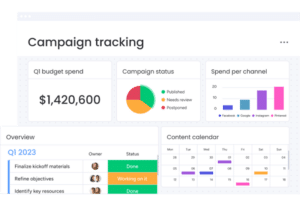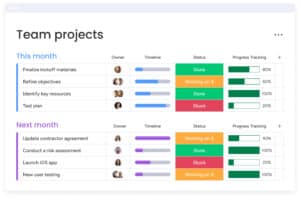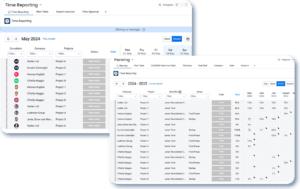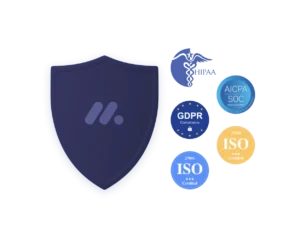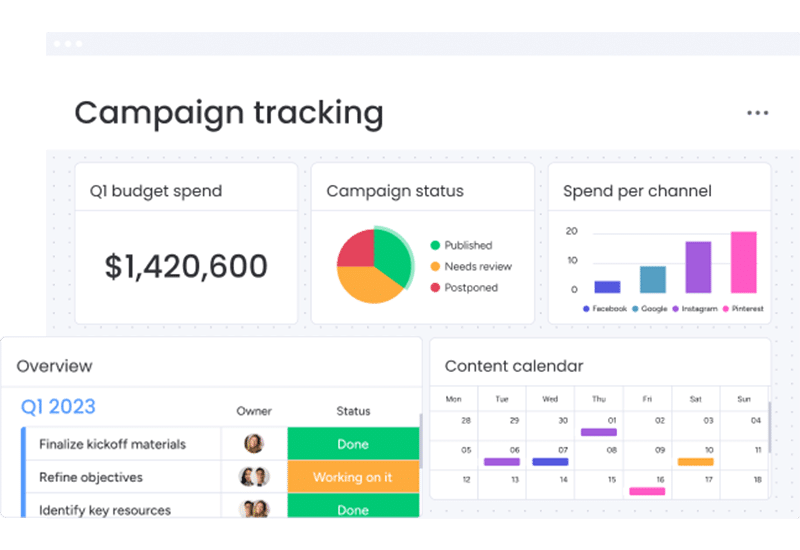In today’s interconnected digital landscape, personal data has emerged as a pivotal resource for businesses, guiding decisions, and shaping interactions. As its importance grows, so too does the need for stringent measures to protect this data. Leading the charge in this realm is the General Data Protection Regulation (GDPR), a robust regulatory framework that ensures organizations handle the personal data of EU citizens with utmost transparency and care. In this blog post, we’ll cover the topic of ensuring GDPR compliance in CRM data management.
Grasping the Weight of GDPR
The GDPR isn’t merely a regulatory guideline to be checked off a list. It signifies a monumental shift in the broader societal approach to data privacy and protection. Organizations, irrespective of their geographical boundaries, must recognize the gravity of these regulations. Non-compliance doesn’t just result in hefty financial repercussions but can also erode the trust and reputation painstakingly built over years.
CRM Systems and the GDPR Umbrella
Customer Relationship Management (CRM) systems stand at the forefront of this data revolution, acting as vast reservoirs of valuable customer information. From contact details and preferences to transactional histories, these systems contain sensitive data that falls squarely under the GDPR purview. Ensuring that CRM platforms adhere to GDPR guidelines is not just about navigating legalities—it’s about fostering trust and safeguarding customer relationships.
Understanding GDPR in the Context of CRM
Customer Relationship Management systems are more than just tools; they are repositories of nuanced interactions, customer insights, and vast troves of personal data. When the GDPR came into effect, it was clear that these platforms would play a central role in the quest for compliance. To navigate this complex territory, it’s essential to first comprehend the GDPR’s core tenets and how they intersect with CRM functionalities.
What GDPR Means for Customer Data
At its heart, the GDPR is about giving control back to individuals over their personal data. This implies:
- Transparency: Organizations must clearly communicate how they use personal data.
- Consent: Personal data can only be processed if there’s explicit consent from the individual.
- Access: Individuals have the right to access their data and know how it’s being used.
- Rectification and Erasure: Individuals can correct inaccurate personal data and even request its deletion in certain circumstances.
The Rights of the Individual Under GDPR
The GDPR has enshrined specific rights that every EU citizen possesses concerning their data. These include:
- Right to be Informed: Organizations need to be transparent about how they’re using personal data.
- Right to Object: Individuals can prohibit certain data uses.
- Right to Data Portability: Allows individuals to obtain and reuse their data for different services.
- Right to Restriction: People can limit the way organizations use their data.
- Right to Rectification and Data Erasure: As mentioned earlier, a critical aspect allowing individuals to maintain accuracy and even opt for removal of their data.
Specific Obligations for Companies Managing Customer Data
With these rights in place, companies are faced with specific responsibilities when managing customer data within their CRM systems. They must:
- Ensure data is processed lawfully, transparently, and for a specific purpose.
- Implement data protection measures from the onset, ensuring privacy by design.
- Maintain records and documentation proving GDPR compliance.
- Regularly update security measures, safeguarding data against breaches and unauthorized access.
Omnitas Newsletter
Sign up for our monthly newsletter to stay up-to-date on our latest blog articles, videos and events!
Thank you!
You have successfully joined our subscriber list.
Steps to Ensure GDPR Compliance in CRM Systems
Achieving GDPR compliance within a CRM system isn’t an overnight task but a continual process that requires foresight, regular assessment, and the adoption of best practices. Here are the pivotal steps that organizations must take to ensure their CRM systems adhere to GDPR standards.
Data Mapping
Understanding the intricacies of your CRM data is the first step towards compliance.
- Identify: Pinpoint where all personal data resides within the system.
- Categorize: Classify the data based on sensitivity and purpose.
- Flow Mapping: Understand how data moves through the system, noting all touchpoints and areas of potential vulnerability.
Data Minimization
The principle of data minimization under GDPR mandates that only essential data should be collected and stored.
- Assessment: Regularly review the data being collected and ask if it’s truly necessary.
- Purge: Establish a routine where unnecessary data is deleted at regular intervals.
Consent Management
Having clear consent mechanisms is at the core of GDPR.
- Explicit Permission: Ensure that when data is collected, clear consent is given.
- Consent Records: Maintain a record of when and how consent was provided.
- Revocation: Implement an easy process for users to withdraw their consent.
Security Measures
Protection of personal data against breaches is non-negotiable.
- Encryption: Encrypt sensitive data to shield it from potential breaches.
- Regular Audits: Perform system audits to detect vulnerabilities.
- Immediate Action: Establish protocols to act swiftly in case of a data breach.
Access Control
Limiting who can access the data within a CRM system is crucial.
- Role-Based Access: Define roles and restrict data access based on these roles.
- Multi-Factor Authentication: Implement added layers of security before granting access.
- Regular Reviews: Continually assess who has access and adjust as necessary.
Transparency and Clear Communication
Open communication builds trust and ensures users know their rights.
- Clear Policies: Make privacy policies and terms of service easily accessible and comprehensible.
- Update Notifications: Inform users promptly of any changes to data collection practices or policies.
Data Portability
GDPR gives individuals the right to move their data between services.
- Easy Extraction: Offer mechanisms for users to easily download their data.
- Interoperable Formats: Ensure the data is provided in a format that can be easily imported into another system.
Right to Erasure
Sometimes referred to as the ‘right to be forgotten’, this allows individuals to request data deletion.
- Simple Request Process: Offer an uncomplicated procedure for users to ask for data deletion.
- Prompt Action: Once a request is made, ensure the data is deleted in a timely manner.
These steps are essential in creating a robust GDPR-compliant environment within CRM systems. Adhering to these not only ensures legal compliance but also fosters trust among users and customers.
Regular Training and Awareness Programs
Ensuring GDPR compliance in CRM data management is an ongoing effort that goes beyond mere system adjustments. It’s a cultural shift that requires everyone in an organization to be on the same page. One of the most effective ways to engrain this in a company’s DNA is through regular training and awareness programs.
The Necessity for Continuous Education
With regulations evolving and the digital landscape continuously shifting, staying updated is paramount. Training sessions serve as refresher courses, reinforcing the importance of GDPR and its nuances, especially in the context of CRM data management. They also provide an opportunity to introduce any new guidelines or best practices that have emerged.
Tailored Training Modules
Generic training sessions might miss the mark. It’s crucial to design modules that specifically address the challenges and needs of managing personal data within CRM systems. Highlight real-life scenarios, discuss potential pitfalls, and underscore the importance of ensuring GDPR compliance in CRM data management.
Inclusive Awareness Campaigns
Training sessions are typically targeted at teams directly handling data. However, a wider awareness campaign can help in creating an organizational culture where data privacy is valued. Engage employees through webinars, newsletters, and interactive sessions that emphasize the importance of GDPR in their day-to-day operations and the broader CRM data management landscape.
Regular Evaluations and Feedback
Post-training evaluations can offer insights into areas that need more emphasis or clarity. Encourage feedback from participants and use it to refine future training sessions. It not only aids in improving the training content but also ensures that the primary objective—ensuring GDPR compliance in CRM data management—is consistently achieved.
Accessible Resources and Materials
Provide employees with easily accessible resources—guides, manuals, and checklists—that they can refer to when in doubt. Keeping a repository that’s updated regularly ensures that the latest information on GDPR and CRM data management is always at their fingertips.
By embedding regular training and awareness programs into an organization’s routine, companies can effectively navigate the intricacies of ensuring GDPR compliance in CRM data management, making it an integral part of their operational ethos.

Regular Audits and Reviews
An essential component of ensuring GDPR compliance in CRM data management is the regular inspection of systems, processes, and protocols through audits and reviews. These periodic evaluations provide a comprehensive overview of the existing data landscape, pinpointing areas of improvement and confirming adherence to GDPR regulations.
The Significance of GDPR-Centric Audits
Audits are not just bureaucratic exercises. They are pivotal in validating that the organization’s CRM data management practices align with GDPR guidelines. With data being dynamic and ever-evolving, it’s paramount to have regular checkpoints ensuring its protection and compliant handling.
Structured Audit Processes
A systematic audit process is vital. It should encompass:
- Scope Definition: Clearly delineate what the audit will cover within the CRM system.
- Risk Assessment: Identify potential areas of non-compliance and rank them based on severity.
- Data Sampling: Extract subsets of data to check for GDPR compliance.
- Findings and Recommendations: Document any discrepancies and suggest corrective measures.
Utilizing External GDPR Experts
Sometimes, an external perspective can shed light on overlooked aspects. Engaging with GDPR experts or consulting firms can offer unbiased insights into the CRM data management processes, ensuring comprehensive compliance checks.
Reviewing Consent Mechanisms
A crucial part of GDPR is the collection and management of user consent. Regular reviews should assess:
- How consent is acquired.
- How often it’s renewed.
- The ease with which users can revoke their consent.
- Ensuring that consent records are maintained accurately within the CRM.
Continuous Feedback Loop
Audits should not be a one-way street. Feedback from departments interacting with the CRM system can provide valuable insights. By incorporating this feedback, audits become more holistic and aligned with practical challenges in ensuring GDPR compliance in CRM data management.
Immediate Corrective Actions
Post-audit, it’s crucial not just to document findings but to act on them promptly. Any gaps in GDPR compliance identified during the audit should be addressed immediately, ensuring the CRM system remains compliant and avoids potential regulatory penalties.
Through regular audits and reviews, organizations can foster a proactive approach, consistently staying ahead in the realm of GDPR compliance, particularly in the complex world of CRM data management.
Conclusion
As the digital world grows increasingly complex, safeguarding personal data within CRM systems remains paramount. The intricacies of ensuring GDPR compliance in CRM data management can seem daunting, but with the right practices, tools, and expert guidance, it becomes manageable and integral to a company’s operation.
Omnitas: Your Partner in GDPR Compliance
At Omnitas, our dual expertise in management consultancy and IT positions us uniquely to understand the managerial and technical challenges of GDPR compliance in CRM data management. We’re not just consultants; we’re strategic partners, guiding businesses through the maze of regulations, ensuring that they not only comply but thrive.
Why monday.com Stands Out
When it comes to CRM systems, monday.com is a frontrunner in GDPR-compliant practices. Its user-centric design, robust data protection features, and transparent processing mechanisms make it an ideal choice for organizations aiming to ensure GDPR compliance. With Omnitas by your side, leveraging monday.com for your CRM needs is seamless. Our longstanding partnership and expertise with monday.com ensure that our clients get the best of both worlds: a world-class CRM and a tailored approach to GDPR compliance.
Embarking on a GDPR-Compliant Future
Navigating the GDPR landscape requires commitment, diligence, and the right partnerships. Whether you’re just starting your GDPR journey or looking to refine your processes, remember that the journey towards compliance is continuous. With platforms like monday.com and expert consultants like Omnitas, you’re not walking this path alone. Reach out to us below and let’s have a look at your current processes and how we can together ensure continuous GDPR compliance within your organization.


